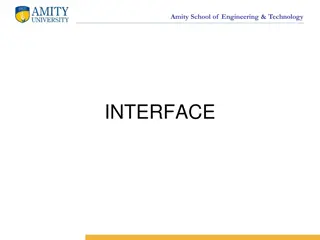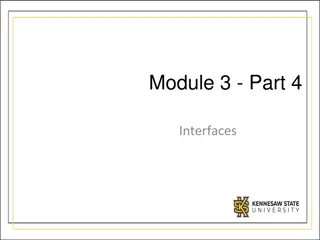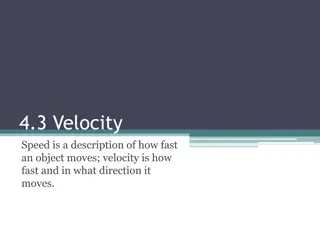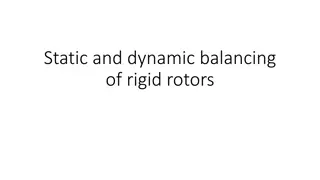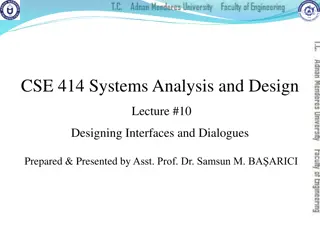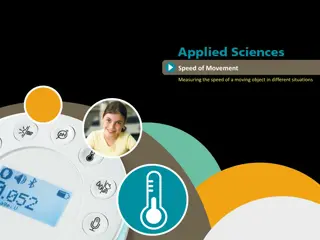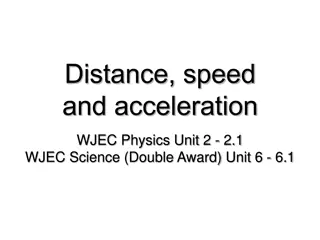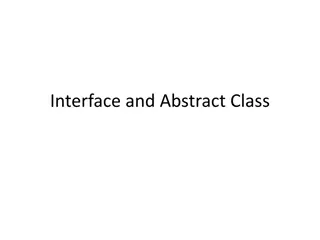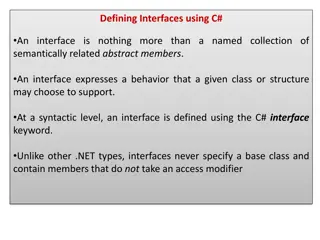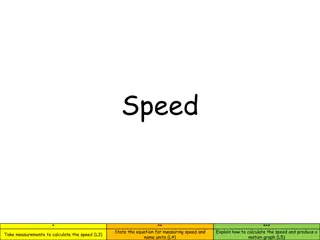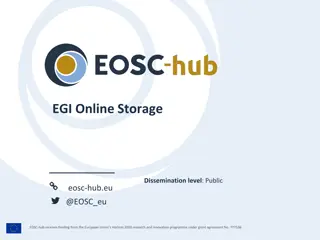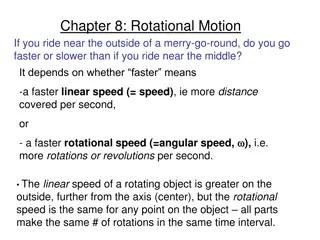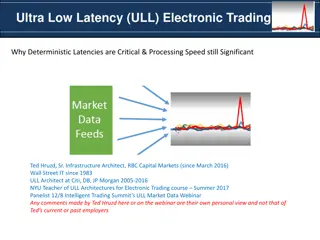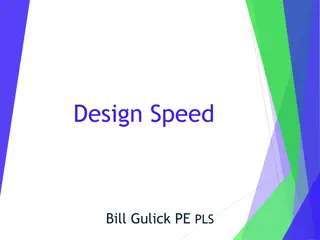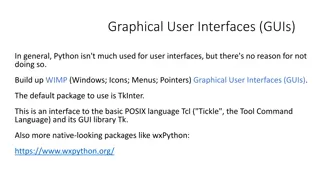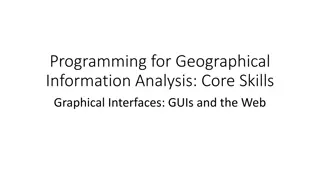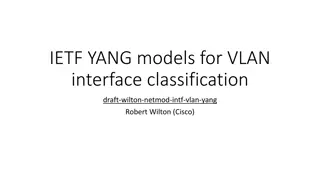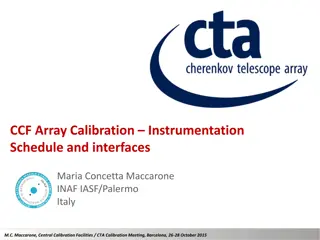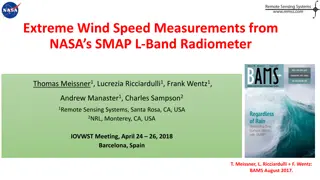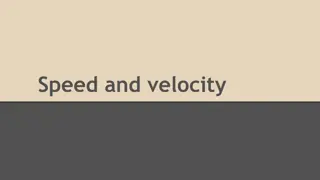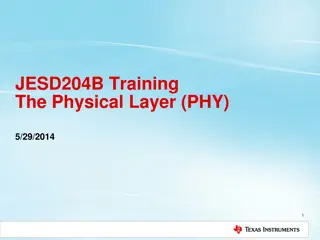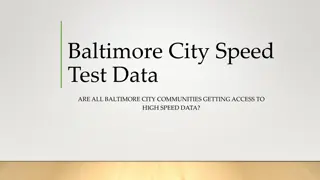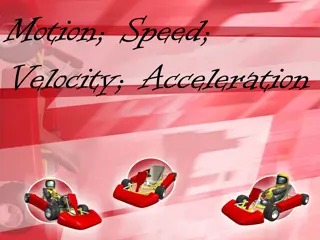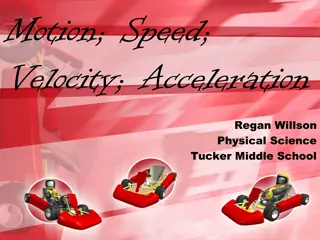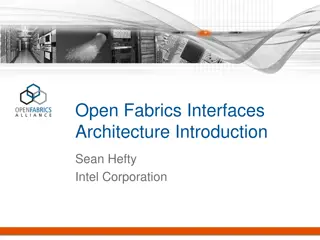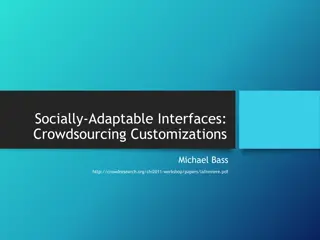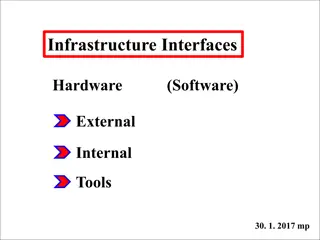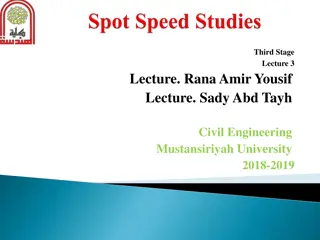Understanding Java Interfaces in Amity School of Engineering & Technology
Java interfaces are a key concept in object-oriented programming that allows for achieving multiple inheritance. The article discusses how Java interfaces work, their role in defining class behavior, and the differences between interfaces and classes. It also explains the syntax for declaring interf
2 views • 48 slides
Understanding Interfaces in Object-Oriented Programming
Interfaces in OOP provide a way for unrelated classes to share common methods without implementation details. They serve as a set of requirements that must be implemented by classes. By creating interfaces, we can enforce standards and avoid issues like the "Diamond of Death" problem that arises fro
1 views • 17 slides
Understanding Velocity vs. Speed in Physics
Velocity and speed are fundamental concepts in physics that describe how fast an object is moving and in what direction. While speed is a scalar quantity representing the rate of motion, velocity is a vector quantity that includes both speed and direction. Constant velocity implies steady speed and
0 views • 8 slides
Understanding Rigid Rotor Balancing and Critical Speed
Explore the concepts of static and dynamic balancing of rigid rotors, determining when a rotor can be assumed rigid based on speed, examining Jeffcott rotor critical speed problems, and discussing the simplest model of rotor systems. Learn about rotor imbalance, free vibrations, natural frequency, a
1 views • 29 slides
Understanding Free Fall and Acceleration in Gravity
Objects in free fall experience acceleration due to gravity, increasing their speed by 10 meters per second each second. The acceleration is denoted by 'g,' with an average value of around 10 m/s². When falling from rest, the speed of an object can be calculated using the formula v = gt. Likewise,
1 views • 21 slides
Designing Interfaces and Dialogues in Systems Analysis and Design
This lecture focuses on the process of designing interfaces and dialogues in systems, discussing methods for interacting with a system, designing human-computer dialogues, and creating graphical user interfaces. It covers guidelines for layout design, structuring data entry fields, providing feedbac
3 views • 62 slides
Understanding Interfaces in Physical Pharmacy
Interfaces play a crucial role in physical pharmacy, dividing phases like solid, liquid, and gas. Liquid interfaces involve surface tension due to cohesive and adhesive forces. This chapter explores the classification and properties of interfaces, shedding light on the behavior of molecules at the b
0 views • 66 slides
Understanding Speed of Movement in Different Situations
Exploring the concept of speed in the context of moving objects, this activity aims to analyze changes in speed, create hypotheses, and test them using a built-in GPS sensor. The theoretical background covers the definition of speed, its relation to distance and time, as well as the distinction betw
2 views • 27 slides
Introduction to React.js: Building User Interfaces with Components
React.js, a free and open-source front-end JavaScript library by Facebook, is used for building user interfaces based on UI components. It allows for creating reusable components, handling the view layer for web and mobile apps, and offers advantages such as speed, flexibility, performance, and more
0 views • 7 slides
Understanding Distance, Speed, and Acceleration in Physics
Explore the concepts of distance, speed, and acceleration in physics with practical examples and calculations. Learn how to calculate speed, interpret distance-time graphs, differentiate between speed and velocity, and understand acceleration through scenarios involving various moving objects. Gain
9 views • 12 slides
Understanding Interfaces and Abstract Classes in Java
Interfaces and abstract classes play a crucial role in Java programming by defining contracts and blueprints for classes to implement. Interfaces provide a way for classes to declare their capabilities, while abstract classes allow for partial implementation. This article explains the concepts of in
1 views • 19 slides
Understanding Centrifugation: Industrial and Laboratory Applications
Centrifugation is a procedure that utilizes centrifugal force to separate components based on density in mixtures for both industrial and laboratory purposes. This process involves the rotation of particles at high speeds to induce sedimentation. Different types of centrifuges, such as low-speed and
0 views • 18 slides
Understanding Circular Motion in Physics
Circular motion involves objects moving in a circular path at a constant speed, experiencing acceleration and centripetal force. This motion is characterized by angular speed, centripetal acceleration, and the necessary centripetal force. The concept of uniform circular motion and angular displaceme
3 views • 38 slides
Understanding Interfaces in C#
Interfaces in C# define behavior that classes or structures can choose to support. They contain abstract members and do not specify a base class. Interfaces must be implemented by classes to bring functionality. Learn how to define and implement interfaces in C# to create flexible and modular code s
1 views • 22 slides
Ultimate Guide to Pinewood Derby Speed Clinic
Pinewood Derby Speed Clinic offers innovative techniques and a reverse build concept to maximize your car's speed. Learn the principles of speed, steps for the reverse build, and key design decisions to enhance performance. Explore baking the car for weight distribution, extending the wheelbase, det
2 views • 14 slides
Understanding Speed and Motion: Equations, Calculations, and Graphs
Speed is defined as the distance traveled per unit of time and is measured using the equation Speed = Distance/Time, with units typically in meters per second (m/s). To calculate speed, measure the distance traveled and the time taken. Motion graphs can be used to visualize speed by plotting time on
2 views • 11 slides
Addressing User Credentials and Security in CCSDS Service Interfaces
The discussion revolves around the need to define user credentials within CCSDS service interfaces for enhanced security. Various aspects such as the lack of specific specifications, authentication requirements, and proposed actions for securing service interfaces are highlighted. Suggestions includ
0 views • 11 slides
Overview of EGI Online Storage Service Architecture and Interfaces
EGI Online Storage service provided by EOSC-hub under Horizon 2020 program offers File Storage, Block Storage, and Object Storage options. Users can access highly scalable storage with different interfaces. The service allows data access through standard protocols, fault tolerance replication, globa
0 views • 18 slides
Database Deployment Automation for IMS Interfaces
Automate your database deployments for IMS interfaces within the scope of various systems and interfaces including Wells Fargo, SUNTAX, transport scanners, KODAK, Fujitsu, FDLE, CAMS, DBPR, and more. This includes interfaces to GTA, CAMS, Wells Fargo, Florida Department of Law Enforcement (FDLE), an
0 views • 9 slides
Enhancing and Testing Repository Deposit Interfaces
Talk by Steve Hitchcock at Open Repositories Conference on enhancing and testing repository deposit interfaces, focusing on open access Institutional Repositories, user value, new deposit interfaces, testing results with SWORDv2, and boosting deposit rates. Credits and acknowledgements for the proje
0 views • 23 slides
Understanding Rotational Motion: Linear vs. Angular Speed
Exploring the concept of rotational motion, this content delves into the comparison between linear speed (tangential speed) and rotational speed (angular speed). It discusses how the linear speed varies based on distance from the axis of rotation, while the rotational speed remains constant for all
0 views • 27 slides
Importance of Ultra-Low Latency in Electronic Trading
Understanding deterministic latencies and processing speed is crucial in ultra-low latency (ULL) electronic trading to ensure optimal access to market data. Ted Hruzd, an industry expert, emphasizes the significance of Speed2 over raw speed (Speed1) in maximizing trading revenue for Market Makers by
0 views • 13 slides
Understanding Design Speed in Highway Engineering
Design speed in highway engineering refers to the selected speed used to determine the geometric features of roadways. It has evolved over time, with the current definition emphasizing safety, driver expectations, and balancing various factors like social, environmental, and economic considerations.
0 views • 12 slides
Python GUI Development: Creating User-Friendly Interfaces
Python can be effectively used for creating Graphical User Interfaces (GUIs) by leveraging libraries like Tkinter and wxPython. This guide covers GUI design principles, event-based programming, and tips for enhancing the user experience. It emphasizes the importance of designing intuitive interfaces
0 views • 6 slides
Introduction to Graphical User Interfaces (GUIs) in Python for Geographical Information Analysis
This content provides insights into creating Graphical User Interfaces (GUIs) in Python for Geographical Information Analysis. It covers the basics of GUI development using TkInter and event-based programming with a focus on user experience design and functionality. The lecture emphasizes the import
0 views • 45 slides
Understanding Interfaces and Classes in Java
Explore the concept of interfaces and classes in Java programming. Learn about defining methods in interfaces, implementing interfaces in classes, and the relationship between classes and interfaces. Discover how interfaces can be used to define a common set of methods that classes must implement, l
0 views • 25 slides
Understanding VLAN Interface Classification in IETF YANG Models
This content delves into the concept of interfaces in networking, focusing on child interfaces. It explains the need for child interfaces to apply separate feature and forwarding rules to specific traffic subsets. The discussion covers the characteristics of interfaces, the hierarchy of child interf
0 views • 10 slides
Array Calibration Instrumentation Interfaces and Schedule by Maria Concetta Maccarone at CTA Calibration Meeting
Maria Concetta Maccarone from INAF IASF/Palermo presented on the instrumentation interfaces and schedule for array calibration within the CCF project at the CTA Calibration Meeting in Barcelona. The presentation discussed major interfaces within the CTA instrument, methods for calibration, and the i
0 views • 6 slides
Understanding Extreme Wind Speed Measurements from NASA's SMAP L-Band Radiometer
NASA's SMAP (Soil Moisture Active Passive) mission has been collecting data on extreme wind speeds since April 2015 using an L-band radiometer. The measurements provide valuable insights into wind speed frequencies, with a wide range of signals received by the sensor challenging the data analysis. A
0 views • 17 slides
Understanding Interfaces and Abstract Classes in CS/ENGRD 2110 Spring 2016
Explore the concepts of interfaces and abstract classes in the context of computer science with a detailed examination of their characteristics, implementations, and extensions. Learn how classes implement interfaces, utilize interface methods, and extend other interfaces to enhance functionality in
0 views • 11 slides
Understanding Speed and Velocity in Physics
Speed and velocity are fundamental concepts in physics. Speed is a scalar quantity that can be average or instantaneous, while velocity is a vector quantity that includes direction. Equations such as v=d/t help calculate these values. Average speed and average velocity are important in determining t
1 views • 10 slides
Understanding JESD204B Physical Layer (PHY) in High-Speed Serial Interfaces
The JESD204B training presentation delves into the Physical Layer (PHY) of high-speed serial interfaces, covering topics such as speed grades, compliance types, SERDES solutions for long channels, clocking information, differential link data transmission, and electrical requirements for drivers and
0 views • 20 slides
Baltimore City High-Speed Data Access Analysis
The Baltimore City Speed Test Data analysis examines the internet speed access in various communities within Baltimore City. The report includes details on average download speeds, communities with the lowest speeds, and a comparison of internet speed requirements for different online activities. Th
0 views • 7 slides
Understanding Motion, Speed, Velocity, and Acceleration
Motion is when an object changes its place or position. To describe motion accurately, consider the start and end position, movement relative to a reference point, distance traveled, and direction. Speed refers to the distance traveled per unit of time and can be calculated using the formula speed (
0 views • 25 slides
Understanding Motion, Speed, Velocity, and Acceleration in Physical Science
Explore the concepts of motion, speed, and velocity along with practical examples and calculations. Learn to describe motion, calculate speed using formulas, solve speed math problems, and understand the different ways to calculate speed. Dive into the world of physical science with explanations and
0 views • 26 slides
Evolution of OpenFabrics Interfaces Architecture
Evolution of OpenFabrics Interfaces Architecture aims to align software interfaces with application requirements in the realm of high-performance computing (HPC). With a focus on supporting multiple interface semantics, remaining fabric and vendor agnostic, and adaptable in upstream Linux, the initi
0 views • 42 slides
Revolutionizing Interfaces through Social Adaptability and Crowdsourcing
Explore the innovative concept of socially-adaptable interfaces and crowdsourcing in interface design, allowing users to customize and share task sets for improved functionality and productivity. Learn about traditional vs. adaptable interfaces, the role of crowdsourcing in enhancing user experience
0 views • 7 slides
Enhancing Infrastructure Interfaces for Telescope Operations
In the realm of telescope operations, ensuring clear interfaces is crucial for smooth functioning. This involves addressing ill-defined interfaces, database management, locating interfaces, internal and external interface specifications, and tool requirements without the need for adaptations. By foc
0 views • 13 slides
Understanding Spot Speed Studies in Traffic Engineering
Spot speed studies are essential in estimating vehicle speeds in traffic streams, aiding in establishing traffic parameters, control measures, and safety evaluations. These studies involve recording vehicle speeds at specific locations to analyze speed trends, set speed limits, and assess the impact
0 views • 17 slides
Exploring Speed and Distance Estimation in Speed Trap Lab
Dive into the world of speed and distance estimation with the Speed Trap Lab. Learn how to calculate speed and distance, taking into consideration uncertainties and variations in time measurements. Explore the relationship between distance, time, and speed through engaging visual aids and practical
0 views • 4 slides
